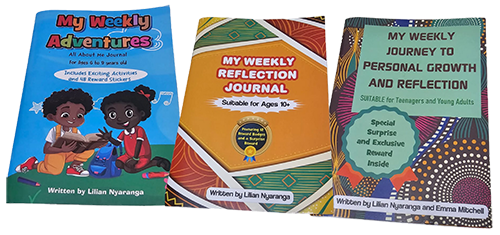By Lilian Nyaranga
In a world where technology dominates our daily lives, encouraging children and young adults to put pen to paper can be a powerful way to unlock their creativity, enhance their writing skills, and foster personal growth. Journals, specifically designed for this purpose, offer a safe space for self-expression, personal reflection, and skill development. In this blog post, we will explore the numerous benefits of journaling for children and young adults, showcasing how it can transform their lives both in and out of the classroom.
Journaling is more than just a means of recording thoughts; it is a gateway to self-discovery and personal growth. While important for people of all ages, this blog specifically highlights its significance for children and young adults. We explore how engaging in this practice can help cultivate essential life skills, develop emotional intelligence, and nurture creativity in them. Below, we’ve compiled some key benefits of journaling for children and young adults.
Enhancing Writing Skills
Journaling provides an ideal platform for children and young adults to improve their writing abilities. It encourages them to explore different writing styles, experiment with vocabulary, and express their unique thoughts and ideas. Through regular journaling, they can develop a stronger command of language, refine their grammar and punctuation, and become more confident writers.
Fostering Self-Awareness and Self-Confidence
Engaging in journaling can significantly boost self-awareness and self-confidence among children and young adults. By writing down their thoughts and feelings, they gain a deeper understanding of their emotions, motivations, and reactions. This increased self-awareness empowers them to take control of their emotions, leading to improved self-confidence. They learn to be comfortable with their thoughts and begin to trust their instincts and abilities, which is crucial in building their self-esteem and self-belief.
Fostering Resilience through Continuous Learning and Growth
Journaling can also play a significant role in fostering a sense of resilience in children and young adults. When they encounter challenges or setbacks, writing about these experiences in a journal allows them to reflect on those situations and gain valuable insights. By identifying what went wrong, they can devise strategies for overcoming similar hurdles in the future. This process of reflection and problem-solving promotes a growth mindset and reinforces the concept that failure is not a dead-end, but rather a stepping stone towards success. It also helps them understand that challenges are part of life and can serve as catalysts for continuous learning and personal growth. Thus, journaling serves as an effective tool that can strengthen their resilience and equip them to face life’s adversities with courage and determination.
Promoting Mindfulness and Gratitude
In a fast-paced world, journaling can become a refuge for mindfulness and gratitude. By encouraging children and young adults to take a few moments each day or week to reflect on their experiences and express gratitude for the positive aspects of their lives, journaling helps cultivate a sense of mindfulness, resilience, and appreciation for the present moment.
Goal Setting and Achievement
Journaling also serves as an effective tool for goal setting. It empowers children and young adults to set and achieve personal goals. By writing down their ambitions and aspirations, children and young adults can keep track of their progress, stay focused on their goals. They also develop a sense of accountability and motivation. The physical act of writing down goals can make them seem more tangible and achievable, and reviewing these goals regularly can provide a sense of direction and purpose. This practice not only cultivates the skill of goal setting but also instills a sense of responsibility and the ability to plan and strategize, which are essential for future success. Journaling allows them to track their achievements, celebrate milestones, and learn valuable lessons from obstacles they encounter along the way.
Emotional Well-being
In the journey of self-discovery, emotional well-being plays a crucial role. Journals provide a safe space for children and young adults to express their emotions, thoughts, and experiences without judgment. By exploring their feelings through journaling, they can develop emotional intelligence, resilience, and self-awareness.
A Holistic Education
Incorporating journaling into educational settings nurtures a comprehensive learning approach. Encouraging children and young adults to embrace reflective practices through journaling bolsters their self-confidence, self-awareness, and overall well-being. The outcome is a generation of confident, self-aware, and goal-oriented students who approach academics with resilience, which can lead to academic excellence.
Real World Preparation
Beyond academic achievements, journaling offers children and young adults the opportunity to develop essential skills that extend far beyond the classroom. By engaging in self-reflection and critical thinking, they can enhance their problem-solving abilities, strengthen their decision-making skills, and foster a growth mindset that will serve them throughout their lives.
In conclusion, the impact of journals on children and young adults is truly transformative. By embracing the practice of journaling, we offer them a powerful tool for self-expression, personal growth, a shift in mindset, and holistic education. Let’s inspire the next generation to embark on this journey of self-discovery, unlocking their true potential and embracing the joy of journaling.







